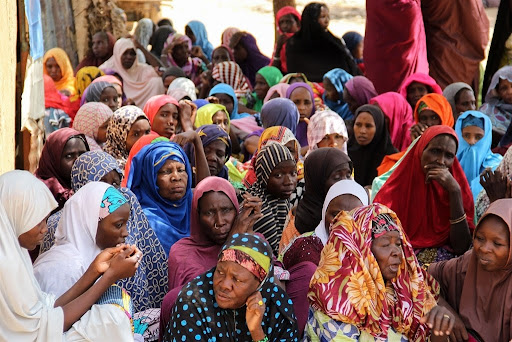Women In Borno IDP Camp Allege Selective Treatment By Officials
Women in Dalori II IDPs camp in Borno State, Northeast Nigeria say they are treated by officials based on whether they are widows or they are with their husbands before they can access relief materials.

A group of women at Dalori II Internally Displaced Persons’ (IDP) camp in Borno State, Northeast Nigeria has alleged that camp officials do selective treatment when it comes to the distribution of relief materials.
Ali Hadiza, a mother of four children, told HumAngle that despite having a food e-voucher provided by the World Food Program’s (WFP) cash assistance program that entitles them to N17,500 cash monthly, the camp officials preferred to put women with husbands over single mothers.
“For the past six months, I have not received my money. I was also informed that there has been an increase in allowance two months ago but I still have not gotten mine,” Hadiza said.
“A few days ago, the governor sent us new vouchers and the officials said we will be registered again. We collected the cards, filled the forms, and signed, but when our SIM cards were about to be linked with the vouchers, they attended to only the men, and women with husbands.”
The e-voucher is part of the WFP’s assistance that allows beneficiaries to buy food in the markets. The vouchers are essentially prepaid debit cards with serial numbers linked to the IDPs SIM cards. Each voucher is automatically loaded with money each month.
Yakura Kumshe, another woman in the camp, says ‘50 per cent of the women’ had not even received the vouchers because ‘they were shared late at night’.
“Some were sleeping, some had traveled and some even fled thinking the camp was being invaded by terrorists. In the face of all this, the officials still delayed the linking process for women who had no husbands,” she said.
“The women that were successfully linked have received their allowance. For us that our cards are yet to be linked we have not seen a penny, and we have children that are hungry. Some women have even resorted to sex work and this is just because our husbands are either dead or detained.”
Kumshe added that in the entire camp, there are hardly 10 women who have husbands out of 250 of them. “How do you expect us to survive with our children?” She asked.
The women urged the WFP to look into their situation and provide a policy that prioritizes women with children rather than women with husbands.
Dalori II IDP camp was created during the Boko Haram insurgency, with more than 15,000 people, most of them coming from the South-east of Borno State. The camp has been targeted by many attacks from Boko Haram militants, including suicide attacks.
This report is a partnership between HumAngle Media and Premium Times Center for Investigative Journalism (PTCIJ) under the ‘Accountability Journalism & Investigative Reporting for Deepening Democracy and Development’ project.
Support Our Journalism
There are millions of ordinary people affected by conflict in Africa whose stories are missing in the mainstream media. HumAngle is determined to tell those challenging and under-reported stories, hoping that the people impacted by these conflicts will find the safety and security they deserve.
To ensure that we continue to provide public service coverage, we have a small favour to ask you. We want you to be part of our journalistic endeavour by contributing a token to us.
Your donation will further promote a robust, free, and independent media.
Donate HereStay Closer To The Stories That Matter




